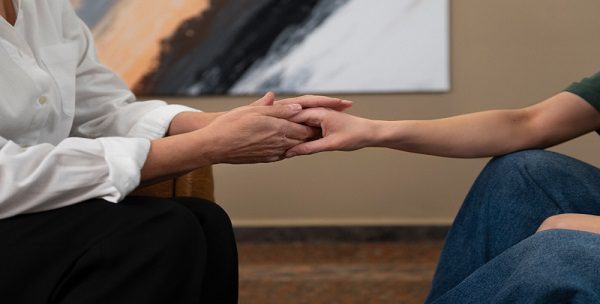
Understanding EMDR Therapy and Its Role in PTSD Recovery
March 12, 2025
How to Support a Loved One on Their Trauma Recovery Journey
March 31, 2025In poetry, they often say trust, once lost, can never be regained. It is like a piece of glass—once shattered, restoration is never complete. However, in Japanese tradition, broken glass is sometimes repaired with gold, turning flaws into something beautiful. This art form is called Kintsugi.
Losing trust in a relationship can feel devastating. Whether the cause is betrayal or infidelity, it creates resentment and suspicion. But it isn’t the end of the tale.
Trust, like broken glass, can be mended. It takes patience, consistency, and an unimaginable amount of hard work—but it can be done. That’s where couple counseling lends a helping hand.
Rebuilding Trust With Couple Counseling
To rebuild trust, communication is paramount. However, that’s where the issue arises. A couple, already mistrusting of each other, is more than likely unable to communicate effectively. Every word is misunderstood and met with distrust, leading only to confusion, arguments, and fights.
Without a clear and open channel for communication, partners won’t be able to fully express what they’re feeling or have felt in the past. Couple counseling provides such a platform. A session between the couple in question and a professional therapist becomes not a courtroom but a place where they can speak their hearts out within a neutral environment, with a non-biased individual—the therapist—guiding them along the way.
The process that therapists follow is not a secret; it is for everyone to see. Laid out like this, it starts to make intuitive sense and has been proven time and time again to work. It goes like this:
- The therapist creates a safe space, acting as a neutral mediator, providing couples with a room where they can speak their hearts out about any topic without arguments. Couples can also learn how to express themselves in a way that doesn’t trigger their partner’s defense mechanisms so that nobody feels blamed. This makes it easier to connect.
- Instead of giving surface-level advice, counseling sessions dig deeper to find the root cause behind why trust was broken and how best to address it.
- They help establish clear agreements on behavior patterns and create a sense of accountability to prevent further damage and start the healing process. After all, trust requires actions to re-establish emotional closeness and consistency in a relationship.
Evaluating Willingness
Before starting couple counseling sessions, it is best to have an honest discussion with yourself and your partner about how willing you are to work on your relationship. Counseling can help address issues and smooth the path to a loving relationship, but it alone cannot bring in the desired results. The couple must be willing to create an environment of growth and healing outside the counselor’s room and actively engage in the arguably difficult but rewarding journey of rebuilding trust.
When to Consider Couple Counseling
It is a misconception that couple counseling is only for those on the brink of separation or experiencing great turmoil. Consider it like exercising—you don’t have to wait until you’re unfit to reap the benefits. It is valuable at any stage of a relationship. While you can seek it anytime, here are some general signs that it may be time to seek help:
- Frequent arguments and unresolved conflicts stemming from improper or hostile communication
- Feelings of resentment or emotional distance
- Trust issues, especially after incidents of betrayal, infidelity, or dishonesty
- A major life change, such as a new job, becoming a parent or retiring
Even happy couples can benefit from counseling. It’s a proactive way to strengthen your bond and address minor issues before they snowball into bigger ones.
Finding The Right Counselor
Your willingness to work on rebuilding your relationship is the primary consideration, but the value of a good counselor must not be underestimated. When looking for a counselor appropriate for you, check for their qualifications, cultural and religious background (which can sometimes make a difference), availability (online, offline, timings), and, most importantly, how comfortable you feel around them. Book a trial counseling session, prepare some questions beforehand, and see how well they respond. A good counselor is essential for effective couples counseling.
Conclusion
A relationship without trust is doomed to fail, but human emotions aren’t so black and white. Love is hard to let go of, and couples who decide to work on their relationship can greatly benefit from couples counseling. Before doing so, ensure you’re prepared for the emotional journey ahead, both inside the counselor’s office and at home, and find a counselor who aligns with you and understands both you and your partner. That is the key.
FAQs
What if only one partner wants counseling?
This situation is far from uncommon. In fact, usually, one person is hesitant to seek therapy—perhaps due to stigma or simply an unwillingness to seek help. Whatever the reason, it shouldn’t be forced upon anyone. Start with individual sessions and ease them into joint counseling.
Can a relationship survive infidelity?
Yes. If a couple truly wants to rebuild their relationship after infidelity, it is possible. However, it requires active effort from both partners, with couples counseling providing the tools needed to heal, move on, and rebuild the lost trust.
How do we know if counseling is working?
Every couple and every situation is different, so the signs aren’t universal. However, generally speaking, signs of progress include better communication, fewer arguments, and a renewed sense of emotional closeness and trust.




